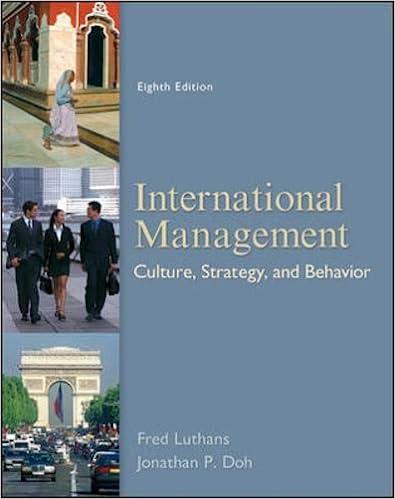Question
The 2022 World Cup final in Qatar was one for the history books, with Lionel Messi lifting the gold tournament trophy for Argentina and fans
The 2022 World Cup final in Qatar was one for the history books, with Lionel Messi lifting the gold tournament trophy for Argentina and fans worldwide cheering the achievements of their favourite national teams.
But on the human rights front, the FIFA World Cup in Qatar was memorable for all the wrong reasons: The lack of protections for women, journalists and LGBTQ people, and the deaths of thousands of migrant workers delivering $220 billion in tournament infrastructure and stadiums over 12 years.
The 14 corporate sponsors of Fédération Internationale de Football Association (FIFA), soccer's global governing body, together pay billions of dollars to reach consumers over a multi-year cycle. Companies expect an untarnished halo; not
threats to their brand image from the sport known as the "beautiful game." Yet throughout Qatar's tournament, FIFA's
corporate partners were imperilled by association with abuses against migrant workers and human rights violations including against LGBTQ rights
At his closing press conference, FIFA president Gianni Infantino claimed it was "the best World Cup ever." But a last-minute ban on beer at stadiums, calls for boycotts, LGBTQ rights armband censorship, player protests, and an unprecedented two migrant worker deaths at the tournament itself put a grim blanket on much of the traditional World Cup excitement.
Alongside soccer, the spotlight was on wage theft, uncompensated deaths of low-paid migrant workers, and Qatar's penal code, which criminalizes extramarital sex and same-sex relations. As the World Cup opened, a Qatari official described
homosexuality as "damage in the mind" and being gay as "haram," Arabic for "forbidden." Then FIFA banned "One Love" LGBTQ solidarity armbands for players. The House of Commons adopted a motion condemning FIFA's threatened
punishment for players.
Late-night television host Stephen Colbert called Qatar's World Cup "Not just anti-gay, but anti-fun."
As FIFA rakes in billions in revenue from sponsors and broadcasters at the world's most-watched sports event, many migrant worker families struggle to feed their children or pay off crushing loans their loved ones took out to pay illegal World
Cup job recruitment fees.
FIFA had to move the tournament from summer to winter because of the extreme heat in Qatar. But Qatari authorities failed to protect the migrant workers who were building the tournament infrastructure from the same deadly working conditions. Even when Qatar finally made crucial reforms for migrant workers protections, they were either not implemented well or came too late.
In response, sportswear giant Hummel hid its corporate logo and produced an all-black "colour of mourning" uniform for Denmark's World Cup team. The company wrote on Instagram: "We don't wish to be visible during a tournament that has
cost thousands their lives." German soccer fans called on their team to boycott, and skip "a lavish football festival on the graves of thousands of migrant workers." In France, whose national team won the 2018 World Cup, Le Quotidien
newspaper announced it would boycott coverage of the tournament. The Australia men's national football team released a video protesting abuse in Qatar: "These migrant workers who suffered are not just numbers."
Ahead of the Beijing 2022 Winter Olympics in February, Olympic sponsors including Coca-Cola and Visa were put on the U.S. congressional hot seat to answer "how they can leverage their influence to insist on concrete human rights
improvements" in China and "how they will manage the material and reputational risks of being associated with an Olympic Games."
As FIFA considers green-lighting future World Cup bids from would-be hosts Saudi Arabia and China, FIFA's sponsors can expect the same treatment. FIFA's corporate partners did not use their financial leverage in 2010 to insist on human rights due diligence when FIFA awarded the tournament to Qatar. As brand risks grew ahead of the Qatar World Cup, sponsors including AB InBev/Budweiser, Adidas, Coca-Cola, Visa and McDonald's backed the call on FIFA to set up a remedy fund to compensate migrant workers and their families for wage abuses, injuries, and deaths. Under pressure from Qatar, that fund to compensate workers for harms and deaths was not established.
In addition to insisting on a remedy fund for worker injuries and harms, FIFA sponsors should now use their exposure, embarrassment, and broken contracts from the Qatar event to demand that FIFA finally make good on its commitment that host governments must protect workers, LGBTQ rights, women and press freedom.
FIFA's sponsors expected only positive images for their brands by associating with joy, fair competition, and human achievement on the World Cup playing fields.
Instead, the legacy of this World Cup for them is already inscribed: when it comes to brand safety in sport, human rights are non-negotiable.
Events and experiences such as the FIFA world cup competitions attract sponsors who put in substantial amounts of money. Assess the wisdom of being a headline sponsor at the FIFA world cup event
Step by Step Solution
3.51 Rating (151 Votes )
There are 3 Steps involved in it
Step: 1
Being a headline sponsor at the FIFA World Cup event can bring significant exposure and marketing opportunities for a company However the wisdom of being a headline sponsor must be carefully assessed ...
Get Instant Access to Expert-Tailored Solutions
See step-by-step solutions with expert insights and AI powered tools for academic success
Step: 2

Step: 3

Ace Your Homework with AI
Get the answers you need in no time with our AI-driven, step-by-step assistance
Get Started


